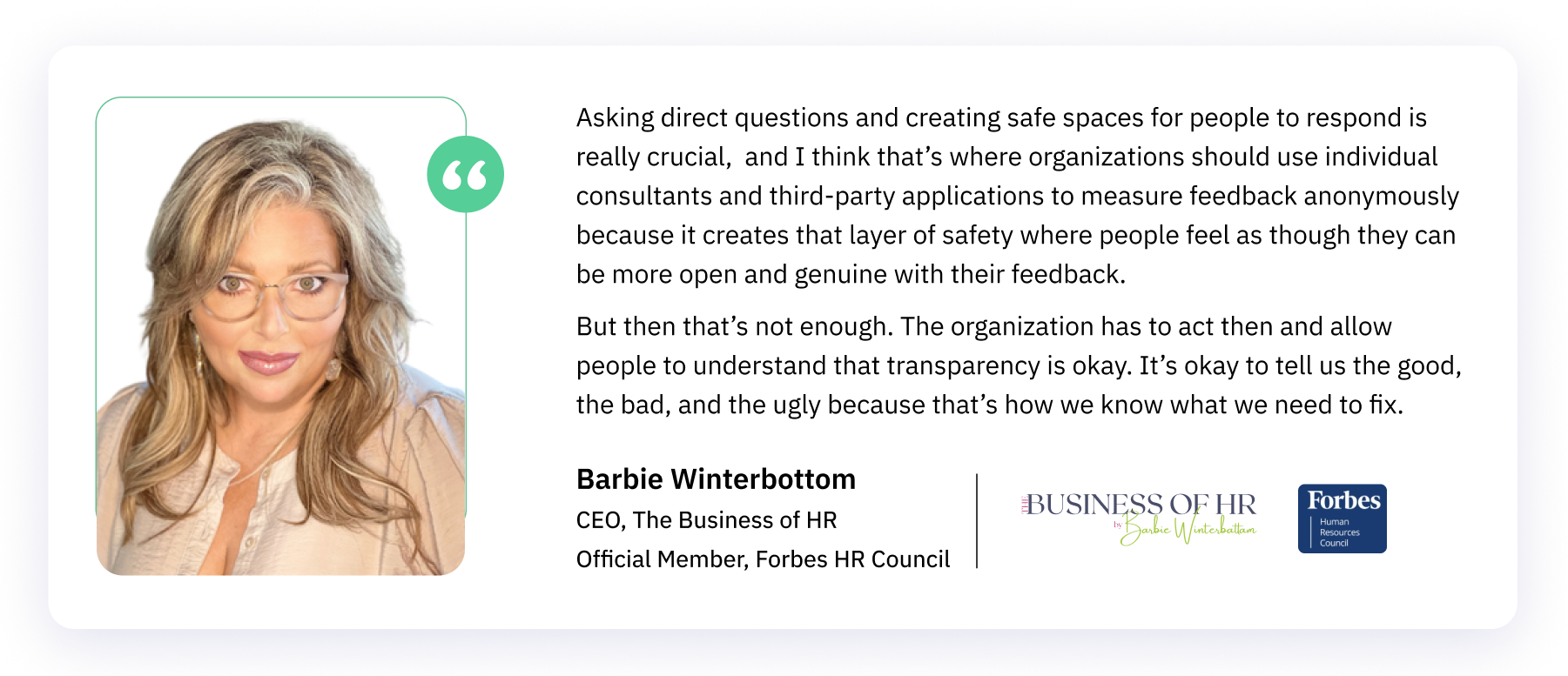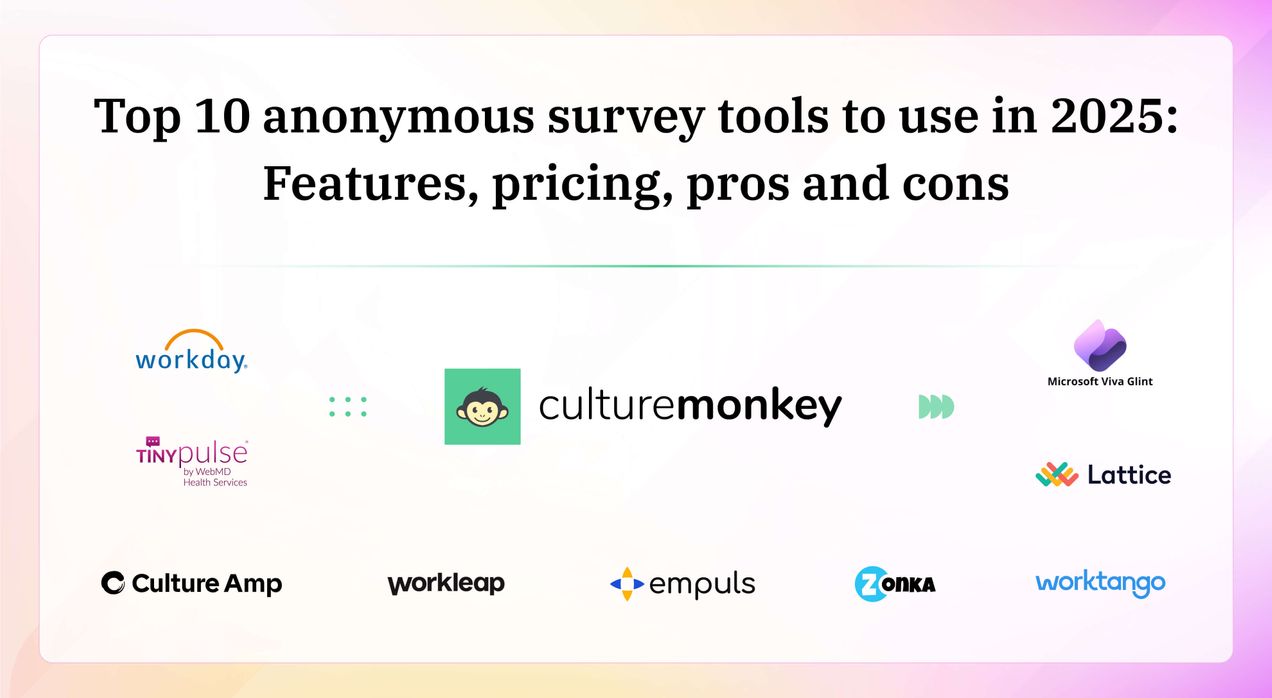Decoding the DNA of anonymous feedback

Often, collecting feedback might make employees uncomfortable due to the obsolete practices that restrict them from providing anonymous feedback. But things aren’t the same, are they? Many organizations started thinking forward and understanding the anonymous employee feedback tool’s benefits.
When businesses allow their employees to shed the clarity of expectations through their input and support, they (the employees) thrive in an innovative environment and do outstanding work while being heard by their employers.
Though employees may feel uneasy about providing constructive feedback, it is critical for a developing organization to make a positive company culture plausible.
And a company culture that values continuous employee feedback is more likely to motivate them to go above and beyond. But when employees don’t provide regular feedback, employers will have no idea what they should focus on and improve.
In this article, we’ll decode the DNA of anonymous employee feedback to every single process detail and examples of how to respond to different types of anonymous feedback. We will also discuss the strategies to improve your participation rates in anonymous employee feedback.
Table of contents:-
- What is employee feedback?
- What is anonymous feedback?
- Why employee feedback should be anonymous?
- Pros and cons of anonymous feedback
- Reasons to implement employee feedback through online surveys
- Types of employee surveys
- What is the difference between anonymous and attributed feedback?
- Anonymous vs confidential feedback
- Why employee feedback start from the top?
- How to implement an anonymous feedback process?
- Strategies to receive anonymous employee feedback
- Criteria to select anonymous feedback tool
- CultureMonkey’s anonymous employee feedback tool
- Anonymous feedback FAQs
What is employee feedback?

Employee feedback is a tool employers use as a constant listening mechanism to assess their employees' pulse, performance and productivity. Employee feedback can be given in a variety of ways, including surveys and focus groups.
It is a critical part of the employee-employer relationship, as it allows employers to get an understanding of how their employees feel about their job and the company as a whole.
One of the unique features of employee feedback is its ability to provide employers with insight into their employees’ opinions and attitudes. By collecting feedback from employees, employers can better understand their employees’ needs and wants. This feedback can help employers form better strategies in order to ensure their employees are satisfied and performing at their best.
Employee feedback can also be used to measure employee engagement and morale. By collecting employee feedback, employers can understand how engaged and satisfied their employees are with their job and the company as a whole. This feedback can be used to develop strategies to increase employee engagement.
What is anonymous feedback?
Anonymous Feedback by Santhosh Kumar
Anonymous feedback is a method of providing feedback in a way that protects the identity of the person or group providing it. It is often used in organizations and can be an effective way to get honest and valuable feedback without fear of repercussions.
An anonymous feedback tool allows employees to provide their thoughts and opinions without feeling any pressure to conform to the views of others, as they do not have to worry about repercussions or criticism for their words. This type of feedback is especially useful for difficult topics, where individuals may be reluctant to speak openly about their views or experiences.
One of the key benefits of anonymous feedback is that it allows individuals to provide honest and open feedback without fear of repercussions. This can be particularly beneficial in situations where individuals are uncomfortable speaking openly or feel they may be judged, as they can provide their feedback without fear of any consequences.
Organizations can also use anonymous employee feedback tool as a way to gain an understanding of team dynamics and behaviors. This can be very useful for organizations, as it can provide insight into how individuals interact with each other, the team dynamics, and how people feel within the group.
So that is why organizations bring a third party to gather anonymous employee feedback since it builds a safe layer between employers and employees while making improvements that increase employee performance and workplace satisfaction.
Why employee feedback should be anonymous?
Anonymous feedback tool allows employers to gain an unbiased, honest perspective on the organization’s operations and culture without the fear of repercussions to the employee who provides the feedback. And it provides useful insight that can help businesses create a better working environment and foster greater employee happiness.
It allows for a level of honesty and openness that may not be possible with non-anonymous feedback. Employees are more likely to offer their true opinions when their identity is not revealed, allowing for a more accurate assessment of the organization.

The secured feedback also offers organizations a way to identify potential areas of improvement. Employees are more likely, to be honest, and open about their experiences without fear of retribution. This can provide insight into areas of operational inefficiency or dissatisfaction that might otherwise go unaddressed.
When employees are ready to open up about their issues, it helps companies develop strategies for improvement. Organizations can develop and implement strategies to address these issues by identifying areas of dissatisfaction. This can help improve employee morale and performance, leading to a more productive workforce.
Pros and cons of anonymous feedback
Anonymous feedback can be a powerful tool, as it allows employees the safety to offer honest and open feedback while also providing employers with a more accurate picture of their employees' feelings and opinions.
However, it can also lead to some drawbacks, such as a lack of accountability, a decrease in the quality of feedback, and an increase in the time and resources required to manage and analyze the feedback.
To best leverage the results and collect employee feedback, it is important that employers consider the benefits and disadvantages of anonymous employee feedback tools and take the necessary steps to ensure that it is being collected and managed in the most efficient and effective way possible.
Cons of anonymous feedback
Encouraging dismissive justification
It is a negative behavior that undermines the importance of the anonymous feedback tool. This type of behavior involves using excuses or justifications to rationalize away the feedback received from anonymous sources. In essence, it downplays the value of the feedback and conveys the message that it is not important.
This behavior is problematic because it ignores the input of the anonymous source, which could benefit the company or individual. Anonymous employee feedback tools can provide valuable insight into the organization's operations, customer service standards, and overall performance.
It can also lead to a lack of trust between the organization and the anonymous source. The anonymous source may feel like their opinion is not valued and will be reluctant to provide feedback in the future. This can damage the organization or individual, as they will miss out on valuable feedback that could help them improve.
Boosting unbelief
Anonymous feedback is often used to provide honest and unbiased opinions on a particular subject, product, or service. However, when people are unsure if they can trust the feedback they receive, they may be less likely to consider it. Therefore, boosting unbelief can lead to a lack of confidence in the feedback that is provided and can lead to a lack of trust in the people who are providing it.
Additionally, boosting unbelief can lead to a lack of accountability. Since people are not sure if they can trust the feedback they receive, they may be less likely to act on any feedback given. This can lead to a lack of accountability for any decisions or actions taken due to the feedback.
Promoting unbelief is a con of anonymous employee feedback tools, because it can lead to a lack of trust in the provided feedback and a lack of accountability. This could lead to a decrease in the quality of the feedback that is given and could have a negative impact on the overall effectiveness of the feedback.
Might attract unhelpful comments
When an anonymous feedback system is implemented, it can be an effective tool for gathering customer feedback and opinions. However, it can also be a source of unhelpful comments due to the lack of accountability. Anonymous employee feedback tools can lead to people feeling free to say whatever they want without repercussions, leading to harsh criticism, personal attacks, or even trolling.
When gathering honest customer feedback, anonymous feedback can be useful, but it can also allow people to post unhelpful comments. People may be more likely to post negative comments when they don’t have to take responsibility for them, as they feel they won’t be held accountable.
To limit the number of unhelpful comments, it is important to set clear ground rules for feedback and to ensure that all comments are moderated. Companies should also provide an option for users to provide their contact details in order to allow customer service to follow up with any comments and provide assistance if necessary.
By taking steps to limit unhelpful comments, businesses can ensure that the feedback they receive is valuable and useful for improving their service.
Pros of anonymous feedback
Encourages honest, unbiased feedback
With anonymous feedback, individuals are more likely to provide a more honest and accurate perspective as they are not worried about consequences for their opinions. Anonymous feedback also allows people to share more sensitive topics, as they do not have to worry about repercussions.
It provides a platform for people to express their true thoughts and opinions without the need to worry about the consequences of their comments. This type of feedback is beneficial as it eliminates the potential for bias and allows the receiver to understand their peers' opinions better.
Eliminates fear of retribution
Anonymous feedback allows employees to voice their opinion without fear of repercussion. Employers are also able to receive feedback from employees without worrying about any potential backlash. This type of feedback is beneficial for both parties as it encourages open communication in a safe environment.
Anonymity in feedback enables employers to gain insight into the working environment, allowing them to make improvements where necessary. It can also be used to identify areas where employees may be struggling and provide the necessary support.
Identifies & addresses issues
When employers implement an anonymous employee feedback tool, it allows those who would not normally speak up to do so without fear of repercussions. The anonymity of the feedback provides an environment of honesty and encourages honesty in response.
Anonymous feedback can identify customer service issues, employee performance, workplace safety, and employee life cycle. It can also be used to identify areas of improvement for processes or procedures. With an anonymous employee feedback tool, if an issue needs to be addressed, it can be identified more easily and acted upon quickly.
For example, it can be used to identify instances of workplace harassment or DEI discrimination. It can also be used to identify areas of improvement when it comes to communication or collaboration.
Unbiased decision-making

Anonymous feedback allows supervisors to make unbiased decisions without preconceived notions or personal biases. This type of feedback is especially useful in the workplace, where employees may be hesitant to express their opinions or share their experiences for fear of negative repercussions.
For example, a company might use an anonymous feedback system to gain insight into how its employees are feeling about their job. Employees can submit feedback anonymously without fear of being identified, allowing the company to get an honest and unbiased assessment of the workplace environment.
The company can then use this information to make decisions about how to improve its policies and procedures without any outside influences that might make the decision biased.
By providing employees with an anonymous feedback system, companies can make decisions that are truly in the best interest of their employees and the organization as a whole.
Enhances understanding
Providing anonymous feedback can allow employees to be honest and open about their thoughts and feelings without fear of judgement, which can lead to greater understanding.
For example, if there is a conflict between two employees in the workplace, anonymous feedback from both parties can provide a more objective view of the situation. It can allow each party to express their feelings without fear of repercussion, enabling both to understand the other’s perspective better. This can help both parties better understand the situation and work towards a resolution.
Overall, anonymous feedback can be a valuable tool for improving understanding in the workplace. It enables employees to express their thoughts and feelings without fear, providing a more balanced understanding of any situation.
Promotes employee engagement & loyalty (scroll the PDF)
Listening to Employees by Santhosh Kumar on Scribd
By allowing employees to voice their opinions and concerns without fear of reprisal, employers can gain valuable insights into their workforce and improve morale. For example, a company may use an anonymous feedback platform to survey their employees about their job satisfaction and their experience with the company.
They can then use this feedback to identify improvement areas and develop strategies to engage and motivate their employees. This can lead to increased employee satisfaction, which can result in greater loyalty and commitment to the company.
Additionally, anonymous feedback can help employers gain insight into employee needs and preferences, leading to more effective and tailored employee engagement initiatives.
Increases participation
Anonymous employee feedback surveys eliminate the fear of potential repercussions from providing feedback, which can motivate people to be more forthcoming with their opinions. Additionally, the lack of a personal identifier helps to ensure that people feel comfortable answering honestly without fear of judgment or reprisal.
For example, a company surveys its employees on their experiences with the company's customer service department. If the employee survey is anonymous, employees are more likely to provide feedback, even if they are dissatisfied with the customer service they have received. This can help the company identify areas of improvement and make necessary changes to improve customer service.
In summary, anonymous feedback surveys can help to increase survey participation rates in the workplace. They provide a safe and secure environment for employees to share their true opinions without fear of repercussions.
Creates safe environment
When people can provide feedback without the fear of being identified, they tend to be more open and honest. This can lead to more meaningful conversations and a greater understanding of the issues at hand.
For example, in a workplace setting, managers can use anonymous feedback to better understand their employees’ thoughts and feelings about their job. They can ask questions like “What do you think are the strengths and weaknesses of our organization?” or “What could we be doing to improve morale?” This allows employees to express their opinions without fear of being judged or reprimanded.
By allowing employees to provide anonymous feedback, managers can gain valuable insights into how their team is experiencing their work environment. This can help them identify areas that need improvement and make the necessary changes to create a more positive work environment.
Builds trust & open communication
When employees feel safe to provide feedback without fear of repercussions, they are able to contribute to a more open, transparent and trusting company culture.
For instance, a manager can create an anonymous employee feedback survey for their team. Team members can provide feedback through the survey without fear of being judged or penalized. This kind of feedback is especially helpful for managers looking to gain insight into how their team is feeling and how they can improve morale.
Anonymous feedback also allows employees to express their opinions and make suggestions openly without worrying about what others might think. This encourages creative problem-solving and encourages people to speak up without fear of judgment.
Reasons to implement employee feedback through online surveys
Companies starting their feedback program by making it anonymous is crucial, as it will encourage employees to voice their concerns. Here are nine reasons why anonymity is important when you implement employee feedback:
- Increased participation: Online surveys provide a platform for employees to express their opinions without any fear of repercussions. This encourages employees to be more honest and forthcoming in their answers, leading to more participation than in traditional surveys.
- Easier to analyze: Online surveys allow companies to collect and analyze data quickly and easily. This makes it easier to identify trends, pinpoint areas of improvement, and compare results across different departments.
- Improved communication: Anonymous online surveys help companies create a culture of transparency and trust. Employees feel more comfortable providing feedback when they know their answers will remain anonymous.
- Consistent results: Anonymous surveys ensure that all employees are given the opportunity to provide feedback, which helps to create a more accurate picture of the company. This leads to more reliable results and better decision-making.
- Ability to track progress: By using online surveys, companies can track progress over time. This allows them to measure the effectiveness of their efforts and identify areas that need improvement.
- Easier to update: Online surveys can be updated quickly and easily. This makes it easy to add or modify new questions as needed.
- Increased engagement: Online surveys can help to engage employees and make them feel like their opinions are valued. This increases morale and motivation, as well as employee loyalty.
- Improved employee retention: Anonymous surveys provide employees with a safe space to express their feedback. This can help to improve employee retention, as employees are more likely to stay with a company that values their input.
- Improved brand image: Anonymity in surveys can help to improve a company’s brand image by demonstrating that their employees are valued and heard. This can help to attract new employees and customers.
Types of employee surveys
There are multiple types of employee surveys out there because different organizations have different needs and goals when it comes to collecting feedback from their employees. Each type of survey allows employers to gain insights into different areas, such as employee engagement, satisfaction, and job performance.
Here are the 5 most crucial surveys you should conduct:
Mental health survey

Having a mentally healthy workforce is essential for companies to achieve their goals and objectives. An anonymous mental health survey can provide insights into employees' mental health, allowing companies to identify and address any issues that may be affecting their performance.
Mental health surveys can provide valuable insights into the work environment. Companies can take steps to improve their mental and emotional health by identifying underlying issues. An anonymous survey may reveal employees are overwhelmed due to high workloads or lack of support. Companies can then provide additional support to help employees manage stress levels.
By conducting an anonymous mental health survey, companies can ensure that their employees are mentally healthy and able to perform at their best. This can lead to improved productivity, higher morale, and greater employee satisfaction, helping companies to achieve their desired results.
Manager effectiveness survey
Conducting a manager effectiveness survey allows the company to get honest feedback from employees, who may be reluctant to speak up if they fear repercussions from their managers. It is also important for the company to understand how employees perceive the manager’s leadership style, communication skills and overall performance.
The survey results can be used to make improvements and ensure that the managers get the support they need to succeed. For example, suppose the survey results show employees feel their manager’s communication is ineffective. In that case, the company can provide additional training to help the manager and people leaders communicate better with their team.
Work environment survey
A work environment survey can be a useful tool to identify potential workplace issues, such as conflicts among staff, lack of resources, or unfair treatment.
For example, an anonymous survey could ask employees questions about their team dynamics, the overall impact of the team, and the support they feel from their managers. This type of survey can also provide valuable insight into improving the work environment, boosting morale and ensuring employee equity.
Anonymous surveys can be a great way for a company to gain honest employee feedback and create a positive and productive work environment.
Employee empowerment survey
An employee empowerment survey is a great way for companies to measure their employees' satisfaction and engagement with the organization. This type of survey can help identify areas of improvement and where the company excels. It also encourages employees to take ownership of their work and feel empowered to make meaningful contributions to the organization.
For example, a company might use an employee empowerment survey to ask employees questions about their job satisfaction, work environment, and career development opportunities. Through the responses, the company can gain valuable insights into how employees feel about their roles, how they view the organization, and what changes could be made to improve their experience.
Work-life balance survey
A work-life balance survey can provide a much-needed perspective on how the company is affecting the overall well-being of its employees. It can identify potential improvement areas to create a healthier balance between work and personal life.
An anonymous work-life balance survey can help identify any stress sources in the workplace and how these can be addressed. For example, if employees are feeling overwhelmed with the amount of work they are expected to do, the survey results can help managers to identify how to distribute tasks better or provide additional resources.
This could help to reduce stress and improve the overall well-being of employees. Anonymous surveys also provide a safe space for employees to express their opinions without fear of judgement.
What is the difference between anonymous and attributed feedback?
Anonymous feedback is a type of feedback given by an individual without divulging their name. It is often provided in surveys and questionnaires, allowing the participant to remain anonymous and provide feedback without fear of repercussions. Anonymous employee feedback is beneficial because it allows people to express opinions without feeling judged or embarrassed.
On the other hand, attribute feedback is given by individuals who identify themselves by name or other means. Attributed feedback can be provided in a variety of ways, such as face-to-face conversations, emails, phone calls, and even online reviews. Attributed feedback is beneficial because it allows the recipient to connect the feedback to a specific person and gain insight into the individual’s thought processes and experiences.
However, attributed feedback has one major drawback; it is not as reliable as anonymous feedback tools. Because the employee’s identity is known, they are more likely to provide biased feedback. This can lead to inaccurate feedback, ultimately leading to wrong decisions being taken by a company.
Anonymous vs confidential feedback
Anonymous feedback is given without the identity of the person giving feedback. This feedback type encourages candid feedback without fear of reprisal or repercussions. It allows people to be more open and honest with their feedback, especially when dealing with sensitive topics. Anonymous employee feedback tool can also be useful for gathering feedback from a larger group, as it allows people to provide feedback without feeling singled out.
Confidential feedback is the feedback that is given but is kept private and confidential. This type of feedback is beneficial because it allows for a more open and honest discussion, as people do not need to be guarded or cautious with their feedback. It also allows for more direct and constructive feedback, as the feedback giver does not need to worry about being judged or criticized for their feedback.

In contrast, confidential feedback can help to foster a sense of trust and openness between employees. Both types of feedback can help to create an atmosphere of open communication, which can be essential in fostering a successful and productive workplace.
Why employee feedback start from the top?
When feedback starts at the top, it sets a precedent that all levels of the organization should follow in order to ensure that employees feel valued and heard by their superiors.
Starting from the top means that management sets an example and demonstrates that they value their employees’ opinions and feedback.
It also helps ensure that employees feel like their opinions are taken seriously, as they know that their input is reaching the highest levels of the organization. This helps to create a work culture of open and honest communication, which can positively impact employee engagement and satisfaction.
When feedback starts at the top, it helps ensure that management receives accurate and timely feedback on their performance. This can help them identify any areas for improvement and make the necessary changes better to meet the organization's and its employees' needs.
To illustrate this point, imagine a manager asking their team for feedback on a recent project. This could start a conversation that could uncover any potential changes that could help to improve the project or any problems that may have been missed. This proactive approach can help ensure that the organization always improves and that employees feel heard and valued.
How to implement an anonymous feedback process?
As anonymous feedback helps to promote a healthy work environment and allows for constructive criticism, here are the top 5 ways to implement an anonymous feedback process:
- Establish clear guidelines: It is important to establish clear guidelines for anonymous feedback. This will help to ensure that employees feel comfortable providing feedback. It is also important to ensure that the feedback is secure and that the anonymity of the employee is maintained.
- Encourage honest feedback: When collecting feedback, it is important to encourage honest feedback from employees. This can be done by offering rewards or incentives for providing thoughtful and constructive feedback. It is also important to remind employees that the feedback process is anonymous and that their identities will remain confidential.
- Handle feedback responsibly: All feedback should be handled in a responsible and respectful manner. It is important to thank employees for their feedback and to take their concerns seriously. If an issue is identified through the feedback process, it is important to address it in a timely manner.
- Use feedback to improve: Anonymous feedback can provide valuable insights into an organization's performance. It can be used to identify areas of improvement and develop strategies for addressing any identified issues. This can help to ensure that the organization is constantly striving to improve.
- Make feedback an ongoing process: Anonymous feedback should not be a one-time event. Regular feedback should be collected in order to ensure that any issues are identified and addressed in a timely manner.
Strategies to receive anonymous employee feedback
By implementing effective strategies to collect anonymous feedback, organizations can benefit in the long run. So here industry-best strategies to receive anonymous employee feedback:
- Acknowledge and respect feedback: Acknowledge and respect the feedback provided by employees, regardless of the nature of the feedback. Let them know that their opinion matters and is being taken into consideration.
- Assure anonymity: Ensuring the employee's anonymity is important to encourage feedback. This will ensure that employees are not afraid to speak their minds and are not worried about repercussions. By integrating advanced frameworks like security service edge, you can safeguard critical data during transmissions, boosting employee trust and driving better participation rates.
- Collect feedback regularly: To ensure that you are getting the most accurate feedback from your employees, collect it regularly. This will help you stay up-to-date on trends and issues within the organization.
- Follow up on feedback: Once you have collected the feedback, follow up on it. Take the necessary steps to address the issues and concerns raised by your employees. This will make them feel valued and that their opinion matters.
- Provide two-way communication: It is important to ensure two-way communication between the organization and its employees. This will allow employees to provide more detailed feedback and help ensure that their concerns are addressed promptly.
- Utilize technology: Utilizing technology is a great way to make it easier for employees to provide feedback. Many online survey platforms can be used to make it easier for employees to provide their feedback anonymously.
- Make it fun: Make providing feedback fun and interactive. This will help ensure employees are engaged and provide feedback.
Criteria to select anonymous feedback tool
Best anonymous feedback tools are software designed to help organizations manage and measure employee performance. They can be used to provide feedback on individual performance, team dynamics, and overall organizational performance.
Here are some criteria to consider when selecting an Anonymous feedback tool:
- Ease of use: The anonymous employee tool should be easy to use and understand, so employees can quickly and easily submit feedback.
- Security: The software must offer secure data storage and ensure the anonymity of feedback to protect employee privacy.
- Customizable: The software must be customised to meet the organization's specific needs.
- Scalable: The tool should be able to scale up or down to meet the organization's changing needs.
- Reporting: Primarily, the tool must provide comprehensive anonymous reporting and analysis capabilities to help organizations better understand their performance.
Anonymous feedback tools can also help build trust among employees. Employees can feel safe to provide honest, unbiased opinions by providing an anonymous platform for feedback. This can increase morale and help build a company culture of open communication and collaboration.
In the long run, using an anonymous feedback tool can help organizations better understand their performance and foster an environment of trust and collaboration. By providing employees with an anonymous platform for feedback, organizations can identify areas of improvement and capitalize on potential opportunities for success.
CultureMonkey’s anonymous employee feedback tool
Anonymous employee feedback is necessary for any organization that wants to maintain high employee participation and satisfaction. The anonymous feedback tools offer useful information about the morale of the workforce and allow employers to detect areas that need to be enhanced. By listening attentively to their opinions and worries, employers can ensure that the workplace is beneficial and efficient.
CultureMonkey's anonymous feedback tool ensures absolute anonymity and privacy for all employee touchpoints. With our anonymous employee engagement surveys, you can enable your employees to voice their opinions. Our GDPR-compliant tool provides complete data security for employee responses and a feature—Anonymous feedback chat within the platform where you can respond to your employees’ feedback.
In short, CultureMonkey’s secure employee engagement platform offers end-to-end anonymity, customizable survey questions, and over 50 customizable employee survey templates, making setting up surveys quick and easy to increase your survey response rates and reduce bias in answers, and ensure data accuracy.
Anonymous feedback FAQs
What is anonymous feedback?
Anonymous feedback is feedback given without identifying the source. It is a way for people to give honest input without fear of repercussions or negative consequences. With CultureMonkey, you, the people leader, can implement anonymous feedback where your employees’ feedback helps you better understand their feelings and opinions, enabling you to identify areas of improvement.
How to collect anonymous feedback?
Anonymous feedback can be collected in a variety of ways, such as online surveys, free suggestion box, and open-ended questions. Online survey platforms like CultureMoneky, are the best way to collect anonymous feedback as they provide a convenient way for participants to provide their opinion while ensuring that the feedback remains anonymous. This helps ensure that participants feel secure and comfortable.
Is anonymous feedback good or bad?
Anonymous feedback can be highly valuable in a workplace setting, allowing employees to provide feedback without fear. This can help foster a company culture of trust, open communication and collaboration. It helps employers to identify issues, strengths and weaknesses within the workplace and provide managers with valuable insights to help improve team engagement.
What are the benefits of anonymous feedback?
Anonymous feedback allows individuals to provide feedback without fear of repercussions or criticism. It allows employees to voice any issues they may have without fear of repercussions and offers a chance to identify areas of improvement. It also encourages employees to engage in open dialogue and provide feedback they might not feel comfortable giving in person.
Should employee feedback be anonymous?
Yes, employee feedback should be anonymous; this allows employees to provide feedback without worrying about repercussions. It also ensures that the feedback is unbiased and employees are judged on the quality of their work rather than their identity. CultureMonkey’s employee engagement platform helps employers identify problematic areas within the organization and take action while maintaining the employees' anonymity.










